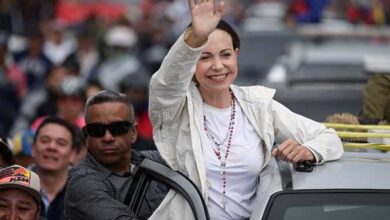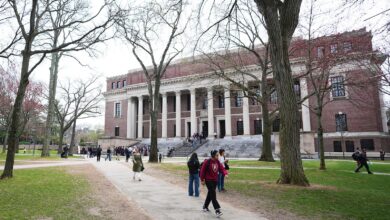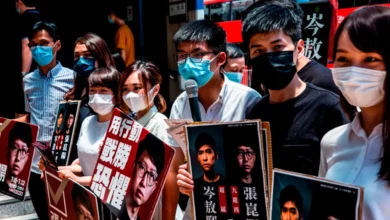Elections for Egypt's upper house of Parliament, the Shura Council, began Sunday with little fanfare. Unlike the first day of voting for the People's Assembly, the lower house — which saw hours-long lines around Cairo and non-stop coverage by local and international media — the Shura Council elections barely attracted any attention. In fact, many polling stations were empty, and citizens had a host of reasons for staying away.
"As a concept, [the council] is important, but in reality it isn't because it doesn't get anything done," said Adam al-Sehemy, a graphic designer who explained that he wasn't voting. Many Egyptians complained about the expense of the elections, while some criticized them as a distraction in a country with more urgent political needs. Other non-voters believed that the Shura Council merely replicates the results of the People's Assembly. "The current elections are awarding extra seats for people who are already in power, such as Islamists," said Michael Mourad, a civil engineer who also chose not to vote. "There is no need to have an upper house of parliament whose members enjoy benefits while their political activity is limited compared to the lower house of parliament."
Such complaints, in various forms, have been voiced throughout the three-decade history of the Shura Council. President Anwar Sadat formed the council in 1980, establishing it as a body of intellectuals and technocrats who could advise the People's Assembly. But the council lacked the most basic power of a parliament — it could not pass legislation. Instead, its main purpose was to offer non-binding recommendations to the cabinet and to the People's Assembly. The Shura Council also managed national councils, whose duties ranged from establishing journalistic guidelines to approving new political parties.
But any potential value of the council was lost in a corrupt political system. Critics described it as little more than a tool of patronage — presidential hopeful and former People's Assembly member Ayman Nour says that in recent years the main purpose of the Shura Council was to reward supporters of President Hosni Mubarak. During those years, one-third of the council was appointed by the president, and the rest was virtually guaranteed to have a National Democratic Party majority, because of vote-rigging. Nour describes it as "an instrument of the security apparatus because it was responsible for the press and the formation of political parties."
This history has contributed to the current skepticism about the purpose of the Shura Council. Prominent activist and former presidential candidate Mohamed ElBaradei believes that the election process is a waste of time and money, and on Twitter he has described the decision to hold this round of voting as a sign of "screwed logic" and "flawed priorities." ElBaradei believes that the election process merely delays the important work of drafting a new constitution — a constitution that, in his opinion, is likely to dissolve the Shura Council entirely.
ElBaradei's concern about the distraction of an election is shared by many citizens.
"People demand an immediate transfer of powers," said Amir Saadallah, a hotel worker who said he decided not to vote. "Instead of focusing on a Shura Council election, we need to have a constitution soon to pave the way for this power handover."
But there are others who believe that the Shura Council could play a valuable role during this time of transition. Yasser Kassab, head of the Regional Center for Parliamentary Studies and Consultancy, says that the council should be reformed so that it holds increased power, as well as a new mechanism for appointing members.
"We are now in a transition period from one regime to another, and we are on the heels of a revolution, so we tend to give more weight to the legislative authority that speaks in the name of the people," says Kassab. In the past, he has monitored discussion of laws in both houses, and he says despite the flaws of the Shura Council, its specialized nature often led to more substantive discussions of laws than the ones that took place in the People's Assembly. According to Kassab, the Shura Council produced high-quality reports that People's Assembly members relied on while discussing legislation.
But Kassab believes that the Shura Council should be granted some legislative powers. With laws passing through two parliamentary houses instead of one, the government would be less likely to produce the kind of flawed legislation that appeared in recent years. Kassab adds that, in a country with Egypt's dense and diverse population, two houses of Parliament would help ensure representation for all.
In the past, there were other attempts at reform. In 2007, constitutional amendments granted the 270-seat Shura Council more legislative power. Those amendments also created a committee composed of members from both houses who arbitrated when the two bodies disagreed about legislation. But the constitutional declaration issued by the ruling military council last March removed these powers, essentially returning the Shura Council to its role of 1980.
According to Article 37 of the Interim Constitution, which lays out the current function of the Council, it is supposed to give reports to the president and the People's Assembly regarding general planning, draft laws and whatever the president refers to it in "subjects related to the state's public policy or policies related to Arab and foreign affairs." By law, the Shura Council is required to approve any legislation from the People's Assembly regarding constitutional amendments, but this is a procedural process that is more decorative than substantial.
In fact, the status of the Shura Council is so uncertain that guidelines about its function and formation continue to shift even as elections take place. The high elections committee announced last week that the third of the Council that is supposed to be elected by the president will be chosen by the next elected head of state, rather than by the ruling military council. With presidential elections currently scheduled for June, the Council with convene and function until then with only the 180 members in place. Of those seats, 120 are being elected through a list-based system, while 60 are through a single-winner system.
Even the candidates currently battling for those spots are philosophical about whether the body will continue to exist in the future. Mohamed al-Menei, a Wafd Party candidate for the Shura Council in North Sinai, said that members will need to be realistic and clear-minded about their value.
"There are a lot of opinions about the Shura Council, so we must ask, 'Will it benefit the country?' If it doesn't, then it is of no use," Menei says. "There are laws that begin in the Shura Council and then go to the People's Assembly. If it can help with formulating laws that will help lift Egypt from its current state, then that is a good thing."
But he pointed out that, according to the Interim Constitution, both houses must gather to choose the assembly that will draft the next constitution. And this, at least in the short term, may prove to be the most important outcome of the Shura Council elections.




